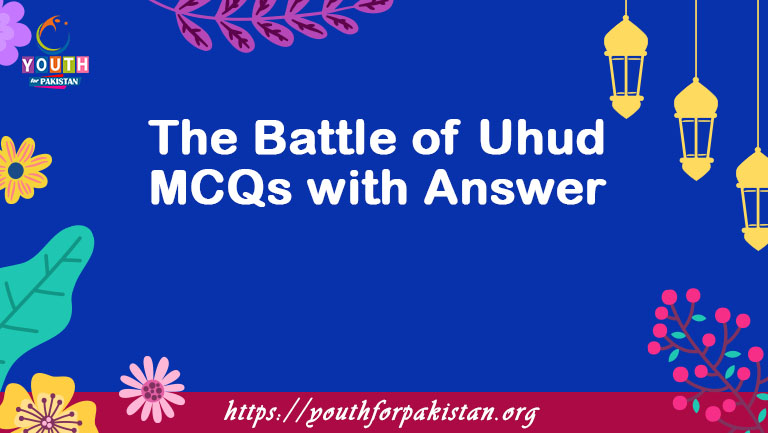The following are The Battle of Uhud MCQs with answers related to Islamic Studies. We have arranged the most important and repeated MCQs in all the competitive examinations. The students can clear their concepts for The Battle of Uhud MCQs online quiz by attempting these.
The Battle of Uhud Online MCQs with Answers
The Battle of Uhud took place in the year:
a) 624 CE
b) 625 CE
c) 626 CE
d) 627 CE
The Battle of Uhud was fought between the Muslims of Medina and the:
a) Persians
b) Romans
c) Quraysh of Mecca
d) Byzantines
Who led the Muslim army during the Battle of Uhud?
a) Abu Bakr
b) Umar
c) Ali
d) Prophet Muhammad
The Battle of Uhud was a consequence of the earlier Battle of:
a) Badr
b) Khandaq (Trench)
c) Tabuk
d) Hunayn
The Battle of Uhud was fought near the city of:
a) Mecca
b) Medina
c) Kufa
d) Damascus
Which companion of the Prophet Muhammad was given the task of commanding the archers in the Battle of Uhud?
a) Abu Bakr
b) Umar
c) Ali
d) Abdullah ibn Jubayr
The archers in the Battle of Uhud were positioned on a hill known as:
a) Mount Safa
b) Mount Marwah
c) Mount Uhud
d) Mount Hira
During the Battle of Uhud, the archers were instructed to:
a) Hold their positions at all costs
b) Charge the enemy lines
c) Retreat to the city
d) Join the Prophet Muhammad’s cavalry
The initial phase of the Battle of Uhud was favorable for the Muslims due to:
a) Successful cavalry charges
b) Effective use of archers
c) Weakness of the Quraysh army
d) Treachery within the enemy ranks
The tide of the Battle of Uhud turned when:
a) The Muslim cavalry retreated
b) The archers left their positions
c) Reinforcements arrived for the Muslims
d) Prophet Muhammad was injured
Who was responsible for initiating the movement of the archers from their positions in the Battle of Uhud?
a) Khalid ibn Walid
b) Abu Bakr
c) Umar
d) Abdullah ibn Ubayy
The movement of the archers from their positions during the Battle of Uhud allowed the enemy to:
a) Capture the Muslim camp
b) Surround Prophet Muhammad
c) Attack the Muslim women and children
d) Regain the upper hand in the battle
Who among the following martyred companions fought valiantly in defense of Prophet Muhammad during the Battle of Uhud?
a) Abu Bakr
b) Umar
c) Hamza
d) Ali
The Battle of Uhud ended with:
a) A decisive victory for the Muslims
b) The defeat of the Quraysh
c) A temporary setback for the Muslims
d) The annihilation of both armies
The Prophet Muhammad was injured in the Battle of Uhud, and rumors spread that he had been:
a) Killed in battle
b) Captured by the enemy
c) Severely wounded
d) Forced to retreat
The Muslims retreated to a location known as the:
a) Hill of Sabra
b) Cave of Thawr
c) Valley of Badr
d) Mountain of Ta’if
The Battle of Uhud resulted in a loss of morale among the Muslims due to:
a) The death of the Prophet Muhammad
b) Heavy casualties and retreat
c) The betrayal of their allies
d) A sudden sandstorm
After the Battle of Uhud, the Quraysh returned to Mecca feeling:
a) Victorious and triumphant
b) Defeated and demoralized
c) Uneasy and cautious
d) Apathetic and indifferent
The Battle of Uhud marked a turning point in the relationship between the Muslims and the:
a) Persians
b) Romans
c) Quraysh of Mecca
d) Jewish tribes of Medina
The Battle of Uhud highlighted the importance of:
a) Following the orders of the Prophet Muhammad
b) Trusting the Quraysh
c) Retreating in the face of danger
d) Ignoring the advice of the companions
The Battle of Uhud led to lessons about discipline, unity, and the importance of:
a) Personal glory
b) Material wealth
c) Following one’s desires
d) Obedience to God and His Messenger
The Battle of Uhud was a reminder that success in battle is not solely dependent on:
a) Leadership
b) Strategy and tactics
c) Weapons and armor
d) Divine guidance and wisdom
The Battle of Uhud showcased the importance of staying steadfast and patient in the face of:
a) Defeat and adversity
b) Victory and triumph
c) Mediocrity and indifference
d) Retreat and surrender
The aftermath of the Battle of Uhud included mourning for the martyrs and:
a) Celebration of victory
b) Blaming the archers
c) Praise for Abdullah ibn Ubayy
d) Negotiations with the Quraysh
The Battle of Uhud led to introspection and a renewal of commitment among the Muslims to:
a) Seek revenge against the Quraysh
b) Establish an independent state
c) Spread Islam by force
d) Follow the teachings of Islam faithfully
The Battle of Uhud demonstrated that the outcome of a battle is ultimately determined by:
a) The size of the army
b) Military strategy alone
c) Divine decree and destiny
d) The strength of alliances
The Battle of Uhud highlighted the concept of patience and perseverance as exemplified by the:
a) Archers on the hill
b) Muslim cavalry
c) Quraysh leaders
d) Roman soldiers
The Battle of Uhud led to the revelation of verses from the Quran that addressed the events of the battle and the conduct of the:
a) Quraysh leaders
b) Muslim women
c) Archers
d) Hypocrites
The Battle of Uhud serves as a historical lesson about the importance of unity and cooperation within the:
a) Muslim community
b) Roman Empire
c) Quraysh tribe
d) Jewish tribes
The Battle of Uhud taught the Muslims about the consequences of ignoring the instructions of the Prophet Muhammad and the importance of:
a) Material gain
b) Personal interests
c) Trusting allies
d) Obedience and discipline
The Battle of Uhud had a lasting impact on the lives and faith of the companions, serving as a source of inspiration for their:
a) Retaliation against the Quraysh
b) Abandonment of Islam
c) Strengthened resolve and determination
d) Reluctance to participate in future battles
The Battle of Uhud revealed the importance of taking precautions and not underestimating the:
a) Strength of the enemy
b) Effectiveness of the archers
c) Role of women in battle
d) Role of allies in battle
The Battle of Uhud was a reminder that military victories and defeats are temporary, but the rewards of faith and perseverance are:
a) Eternal
b) Temporary
c) Conditional
d) Achievable through material gain
The Battle of Uhud emphasized the importance of humility and submission to God, as exemplified by the Prophet Muhammad’s reaction to the events of the battle. This lesson is captured in the phrase:
a) “Praise be to God, the Lord of the Worlds”
b) “In God we trust”
c) “My people, forgive them, for they know not what they do”
d) “God is the Greatest”
The Battle of Uhud reinforced the concept of martyrdom and sacrifice as a path to:
a) Worldly success
b) Eternal salvation
c) Social recognition
d) Financial gain
The Battle of Uhud was a reminder that the ultimate source of strength and victory lies in:
a) Military strategy
b) Weapons and technology
c) Unity and faith
d) Political alliances
The Battle of Uhud highlighted the importance of resilience and determination even in the face of:
a) Defeat and adversity
b) Overwhelming odds
c) Political disagreements
d) Retreat and surrender
The Battle of Uhud was a test of the companions’ faith, as it revealed their reactions to both victory and:
a) Success
b) Defeat
c) Uncertainty
d) Complacency
The Battle of Uhud demonstrated that the success of the Muslims is ultimately determined by their:
a) Weapons and technology
b) Military strategy
c) Obedience to God
d) Wealth and resources
The Battle of Uhud serves as a reminder that believers should not despair in the face of setbacks and should always rely on:
a) Human intervention
b) Divine wisdom and guidance
c) Material resources
d) Political alliances
The Battle of Uhud taught the Muslims the importance of seeking knowledge and guidance from the:
a) Quraysh leaders
b) Prophet Muhammad’s companions
c) Roman Empire
d) Byzantine Emperor
The Battle of Uhud emphasized the significance of having strong leadership and:
a) Financial resources
b) Political connections
c) Knowledge of military strategy
d) Obedience to the Prophet Muhammad
The Battle of Uhud had a profound impact on the development of the Muslim community by shaping their sense of:
a) Material gain
b) Religious obligation
c) Political power
d) Military strategy
The Battle of Uhud serves as a reminder that believers should put their trust in God while also taking necessary:
a) Military precautions
b) Political measures
c) Economic steps
d) Social actions
The Battle of Uhud demonstrated the importance of maintaining unity within the Muslim community and avoiding:
a) Cooperation with the Quraysh
b) Division and discord
c) Apathy and indifference
d) Isolation from society
The Battle of Uhud was a lesson in humility and the need to submit to God’s will, as exemplified by the Prophet Muhammad’s statement:
a) “I have won”
b) “We are invincible”
c) “God’s decree is done”
d) “We will fight again”
The Battle of Uhud highlighted the significance of using military strategy and planning, as well as seeking advice and counsel from:
a) Non-Muslim allies
b) The Quraysh leaders
c) Economic advisors
d) Knowledgeable companions
The Battle of Uhud revealed the importance of not underestimating the:
a) Power of diplomacy
b) Wisdom of the Prophet Muhammad
c) Enemy’s determination
d) Role of women in battle
The Battle of Uhud serves as a reminder that the true source of strength lies in:
a) Weapons and armor
b) Wealth and resources
c) Unity and faith
d) Political alliances
The Battle of Uhud demonstrated that true success is not defined solely by victory on the battlefield, but also by:
a) Material gain
b) Social recognition
c) Faith and righteousness
d) Political power










